GATE Square, the Core District of Kashiwa-no-ha Smart City,
to Have Grand Opening on Tuesday, July 8, 2014
Announcing services and facilities creating innovations
in living, working and learning across a variety of situations
June 5, 2014
Mitsui Fudosan Co., Ltd.
Mitsui Fudosan Co., Ltd. will hold a grand opening for the multi-use facility Gate Square, a central block of Kashiwa-no-ha Smart City (in front of the Kashiwanoha Campus Station on the Tsukuba Express line) in Kashiwa City, Chiba Prefecture, on Tuesday, July 8, 2014. Gate Square’s opening heralds the full-fledged creation of Kashiwa-no-ha Smart City – An Urban Mordel for Our Future, a fusion of the community’s abundant nature and cutting-edge environmental technologies. Complete details of all services and facilities will be announced in conjunction with the grand opening of Gate Square.
Kashiwa-no-ha Smart City, a collaboration between the public sector, private sector and academia, is an urban development designed to resolve issues for the area by achieving coexistence with the environment, the promotion of health and longevity, and the fostering of new industries. Gate Square, as the core area of the Kashiwa-no-ha Smart City, is a station-area zone serving as a gateway to the district by providing an accumulation of lifestyle services that create healthy bodies resistant to illness regardless of age (Health and Longevity), an ecosystem that heightens comfort, efficiency and safety for lives and business (An Environmental-Symbiotic City), and, a community where innovations lead the way into the future (A City of New Industry Creation).
Main Services and Facilities of Kashiwa-no-ha Smart City’s Gate Square
Health and Longevity
- A district of preventative medicine-type health service specialty stores seeking to change health lifestyles from “treatment” to “prevention.”
- A city health laboratory formed through a private industry and academia collaboration between the University of Tokyo and 11 companies aiming to pass on techniques for maintaining youth and health.
An Environmental-Symbiotic City
- A smart grid that maintains the power supply to the city even if the power supply from the power company is halted.
- Reduction of water, power and heating costs through advice about energy reduction given with visualization of energy usage utilizing information communications technology (ICT).
- Creation of a resident and worker exchange area based on a next-generation urban transport sharing system kind to both people and the earth.
New Industry Creation
- A hotel and residences building that caters for various visitor requirements and enables stays from overnight through to long term residence.
- Researchers and overseas students will gather from home and abroad, creating an international exchange residential area sharing lifestyle space, culture and ideas.
- Intellectual exchanges in the Open Innovation Lab and Kashiwa-no-ha Conference Center will create new industries.
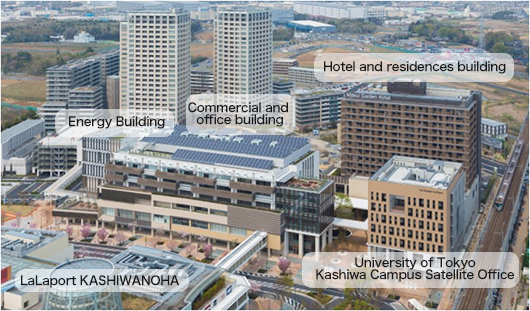
Aerial view of the area around Gate Square
Main services and functions of Kashiwa-no-ha Smart City Gate Square
1. A district of preventative medicine-type health service specialty stores seeking to change health lifestyles from “treatment” to “prevention.”
Kashiwa-no-ha Smart City aims to be a district in which anybody from children through to the elderly can live in a healthy manner in a Japan with a super-aging society unprecedented in the world, and is deploying a service program promoting healthy daily lifestyles prior to the need for treatment or nursing care in an effort to “create healthy bodies resistant to illness.”
Based on these beliefs, the “Town Health Station” has been established on the third floor of the commercial and office building, LaLaport KASHIWANOHA North Wing, featuring 12 outlets providing health services such as medical facilities or those related to exercise and food under the theme of preventative medicine, and which will open on July 8, 2014. (Some outlets on the first and second floors of the same building opened in April 2014).
Kashiwa-no-ha Children’s Dental Clinic, to open inside the “Town Health Station” is the first dental clinic to offer Toyama Prefecture’s Asunaro Method directly through Dr. Masayuki Sano, who employs the method attracting attention across Japan to enable children to take practical steps to enjoying the prevention of cavities. Additionally, other outlets include an internal medicine clinic, sleeping room equipped with an electron restoration treatment device that engages in maintenance of the body down to the cell level, and a yoga studio, women’s fitness club, acupressure salon, culture center, cooking class, new format café, and an insurance consultation center.
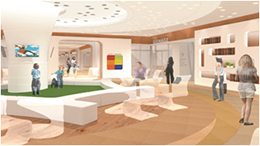
Artist’s impression of the completed “Town Health Station”
|
 |
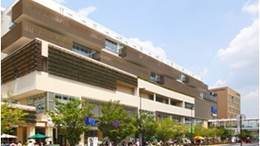
External View of the North Building of the LaLaport KASHIWANOHA |
List of the Stores in the “Town Health Station”
| Store Name |
Type of Business |
Brief Outline of the Store |
| Kashiwa-no-ha Children’s Dental Clinic |
Pediatric dental care |
A pediatric dental care clinic in which even small children can enjoyably visit on many occasions. Clinic staff members aim to create a place where children will enjoy visiting with their family and friends. |
| Kashiwa-no-ha
General Dental Clinic |
General dental care |
A general dental care clinic offering a variety of services for children through to adults and the elderly, together with home visits for treatment. Provides lifelong support for dental care from preventative treatment of cavities and gum disease through to advanced specialist care and regular maintenance. |
| Kashiwa-no-ha
Internal Medicine/Cardiology Clinic |
Clinic |
Treating not only internal disease and cardiovascular diseases, the clinic also uses correct breathing techniques as a core method for measuring cardiac sympathetic nerves, and does not rely solely on modern medical techniques. It hopes to become Japan’s first sympathetic nerve activation preventive medicine clinic. |
| Re:Bone
An outlet in LaLaport KASHIWANOHA |
Acupressure salon |
Improving the body from the basics, approaching treatment through both the bones and muscles, the salon places great importance on counseling, looking into the entire body’s balance and symptoms and presenting patients with individually oriented treatment policies and plans. |
| Hot Yoga Studio
LAVA |
Yoga studio |
Hot Yoga Studio Lava. Lava is the largest hot yoga studio chain in Japan with 120 locations. While respecting the benefits of traditional yoga, this chain also incorporates a variety of methods to develop and provide contemporary Japanese women with programs designed for their bodies. |
| Tokyo Marche
WELL-AGING RESEARCH INSTITUTE |
Community health concierge |
The concierge provides full-fledged health methods not relying on medicine to ensure good aging for everyone from children through to adults. Yoga, fitness kung fu and aroma massaging provide maintenance for the mind and body. It is also equipped with a sleeping room containing an electron restoration treatment device that provides cell-level maintenance inside the body. |
| B-line
LaLaport KASHIWANOHA Store |
Fitness club |
A women’s fitness club, enabling unlimited use each month and repeated daily visits. The basic course starts with the circuit training currently being widely talked about, and is accessible to anyone from their teens to their 80s. |
| Keiyo Gas
Cooking Class
My Leafs Kashiwa-no-ha |
Cooking classes |
Small cooking classes of six people to ensure students can observe instructors. Keiyo Gas cooking classes and the delicious taste of cooked cuisine can be enjoyed by everyone from beginners through to advanced students. |
| Kashiwa-no-ha Culture Center |
Culture center |
A culture center where you can find a new self together with like-minded companions from the community with shared hobbies or objectives. Various courses are on offer to help achieve a fulfilling lifestyle for the residents of the area. |
| Studio Cafe
ZooAdventure |
Café |
ZooAdventure is a café that’s a new style of entertainment space where people can gather together and enjoy playing in the ZooAdventure, relaxing in the café and studying in the studio space.
|
| Town Health Laboratory A-Shi-Ta |
Health support facility |
Using the pivot of aruku (walk), shaberu (talk) and taberu (eat) to support health on a daily basis, this public, private and academic sector collaboration spearheaded by the University of Tokyo and based on the latest academic knowledge is a base for participatory healthy living. The Town Health Laboratory can be used without having to pay a basic charge. |
| Aflac
Understanding Insurance Corner |
Insurance |
This inquiry counter is able to respond to questions such as “where should I start looking when it comes to choosing insurance?” and “what’s the best insurance for me?” Employees with specialized knowledge will work together with visitors for however long it takes to provide solutions for them, and support them in selecting insurance. |
2. A city health laboratory formed through a private industry and academia collaboration between the University of Tokyo and 11 companies aiming to pass on techniques for maintaining youth and health.
The Town Health Laboratory A-Shi-Ta, the core tenant of the Town Health Station to pre-open on July 8, 2014, will be a base for community health support by using cutting-edge health awareness, services and products related to beauty, food and nutrition, oral functions, walking and nursing care prevention to provide various measurement services, specialist advisors and events and lecture programs to maintain youth and health. The basic service is free and this facility can be easily used by anyone.
The laboratory can check on the state of a person’s body by using cutting edge sensor technology. Visitors will be able to use measuring equipment to regularly determine their own state of health through things like the sarcopenia hazard assessment, which gives a cutting edge research result in a primary check of susceptibility to sarcopenia, a disease of muscle degeneration with aging that leads to disability or reduced quality of life, as well as aerobic exercise, walking balance, oral diadocho kinetic ability (degree of speech impairment) and fat buildup around internal organs. Specialists in areas like food and exercise provide detailed advice on lifestyle improvements, while seminars will also be held on health and beauty topics.
Furthermore, a health community will be formed where like-minded friends will be able to enjoy themselves by combining these services with participation in programs such as Getting into Shape, Maintaining Youth and Grand Seniors.
A-Shi-Ta will be operated by the Health Innovation Project (HIP), a research organization formed between private industry and academia through the collaboration of the University of Tokyo and private companies, and will provide programs using such things as cooperating companies’ products, services and knowledge under supervision from an academic viewpoint.
The laboratory will open to community residents on July 8, 2014, and is scheduled for a full-fledged opening from the fall of 2014. By broadening a community where residents are involved in operation of the center as staff members and help improve the health of users, people have become healthy may support others in making the same change, forming a positive cycle within the community as part of a health project requiring societal cooperation.
Companies Participating in Town Health Laboratory A-Shi-Ta
| EN Otsuka Pharmaceutical Co., Ltd. Kao Corporation. Kanamic Network Co., Ltd. Kyocera Corporation. Sunstar Inc. Nichirei Corporation. Mitsui Fudosan Co., Ltd.. Yamashita Corporation. Lion Corporation. Lawson, Inc. and others |
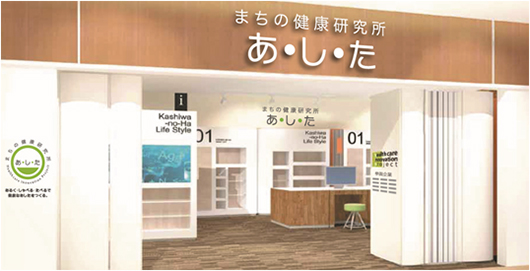
Artist’s impression of the completed Town Health Laboratory A-Shi-Ta

Examples of health measurement equipment that will be available for use at the Town Health Laboratory
3. A smart grid that maintains the power supply to the city even if the power supply from the power company is halted.
Gate Square will incorporate Kashiwa-no-ha AEMS, an ICT system jointly developed with Hitachi, Ltd. to provide for energy management, monitoring, and control for the entire city. An operations base will be set up inside the Kashiwa-no-ha Smart Center and full-fledged operations started from July 8, 2014.
Gate Square is equipped with one of Japan’s largest lithium-ion storage battery systems, solar power generation and an emergency gas-powered generator. The adjacent LaLaport KASHIWANOHA also has a large lithium-ion storage battery (scheduled for installation in late July 2014) and solar power generation. These are all connected to an independently-operated power grid and operated that the Kashiwa-no-ha Smart Center as a smart grid employing ICT systems. By sharing electrical interchange device between districts, Gate Square will contribute to conserving energy and lead to a reduction by 26% of CO2 emissions at peak power times.
Gate Square is capable of providing about 60% of its power use at regular times for three continuous days even if power supply from utility companies has halted, and can also supply electricity to share sections in the adjacent residential district, such as emergency elevators or lighting. It supports the entire district’s Business Continuity Plan (BCP) and Lifestyle Continuity Plan (LCP).
List of the Stores in the “Town Health Station”
| Energy Creation |
Energy Conservation |
Energy Storing |
- Gate Square Rooftop Solar Power Generator
(output: approx. 220 kW)
- LaLaport KASHIWANOHA Rooftop Solar Power Generator
(output: approx. 500 kW)
- Emergency gas-powered generator
(output: approx. 2,000 kW)
- Wind power generator
- Waste heat utilization cogenerator
- Solar heat usage
- Geothermal hot springs energy
- Ground thermal energy use
|
- Area Energy Management System (AEMS)
- Building Energy Management System (BEMS)
- Home Energy Management System (HEMS)
- Task and Ambient Air Conditioning and Lighting System
- Desiccant cooling air conditioner
- Light duct
- Air tube/cool tube
- Rooftop greenery/Wall greening
- Natural exhaust system
|
- Lithium-ion battery
(capacity: approx. 3,800 kWh)
- Large scale energy storage unit (capacity: 11,850 kWh)
- LaLaport KASHIWANOHA ice thermal storage system
- Electric car sharing system that can even be used as an emergency power source for the district
|
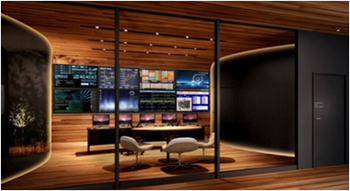
Artist’s impression of the completed Kashiwa-no-ha Smart Center
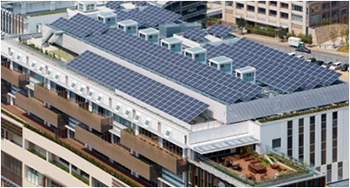
Rooftop solar power generator on the commercial and office building
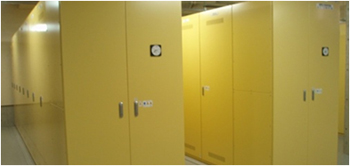
One of Japan’s largest lithium-ion battery systems
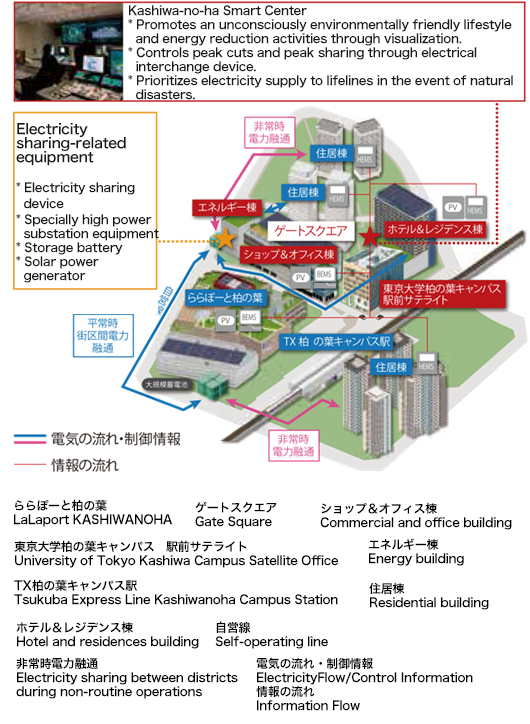
4. Reduction of water, power and heating costs through advice about energy reduction given with visualization of energy usage utilizing information communications technology (ICT).
In addition to AEMS, the system for energy management, monitoring, and control for the entire city, Park Axis Kashiwa-no-ha, the rental housing section of Gate Square, also includes Kashiwa-no-ha Home Energy Management System (HEMS), developed together with Sharp Corporation.
These systems operate mutually, watching over the power use situation in residential areas, commercial and office facilities and advising specifically on energy reduction policies based on people’s lifestyle patterns and workers’ working styles. In the rental housing area, HEMS terminals transmit information from such sources as the commercial facilities and community events and support the materialization of energy conservation at home through community participation (going out).
Additionally, users can control lighting or air conditioning from an external location using a smart phone. Using these systems further carries out energy conservation effortlessly, with an expected reduction of 5% in water, power and heating costs.
Furthermore, Kashiwa-no-ha Points* are offered as an incentive system using AEMS in the commercial and office building and HEMS for residents in the rental housing area for their contribution to reduction of CO2 emissions and peak power cuts on an annual basis.
Accumulated points can be redeemed while shopping at local markets or to obtain discounts at events, further encouraging resident participation in urban development activities.
* Kashiwa-no-ha Points are a community incentive points program for use in Kashiwa-no-ha Smart City. For details about the Kashiwa-no-ha Points program, please see the following website:
http://kashiwanoha-navi.jp/k-point.html (Only in Japanese)
Overview of How ICT Cuts Utility Costs and the Incentive System
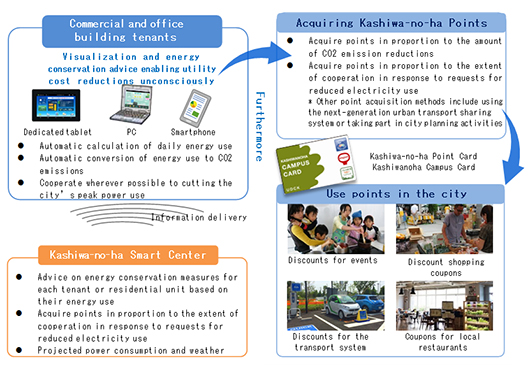
Click here to enlarge
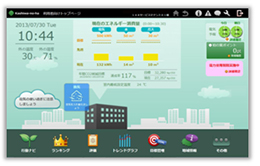
AEMS screen (for commercial and office building tenants)
|
 |
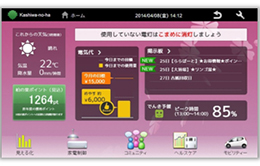
HEMS screen (for rental housing residents) |
5. Creation of a resident and worker exchange area based on a next-generation urban transport sharing system kind to both people and the earth.
Vehicle ports have been newly established at Gate Square for use in the multi-vehicle sharing program where electric vehicles and motorcycles and bicycles are shared among the community. The multi-vehicle sharing program is a system where vehicles are placed in six ports within the city and these can be freely borrowed and returned, contributing to a reduction in CO2 emissions within the city, as well as enhancing transport convenience. Borrowing and returning vehicles is carried out with the Kashiwanoha Campus Card, which can be used in conjunction with Kashiwa-no-ha Points*, and points are also accumulated through using the multi-vehicle sharing program.
* Please refer to p. 6 for information about Kashiwa-no-ha Points.
A new tie-up service has also started with Rakumo, a car-sharing service provided by Toyota Rent a Car. Toyota Motor Corporation’s Aqua, a Rakumo vehicle, will join the Mercedes-Benz Smart, Nissan Motor Corporation Leaf, Yamaha Motor Co., Ltd.’s electric motorcycle EC-03 and electric power assist bicycle PAS in using a single Kashiwanoha Campus Card for shared use.
Furthermore, in alliance with Chademocharge, a rapidly growing battery recharging network spreading nationwide, a recharging station network has been established. This will serve as a base for supporting new mobility and is expected to advance going forward amid the pursuit of greater convenience and environmental performance.
Main Vehicles that can be used with the Kashiwano-ha Campus Card


Port location map for the multi-vehicle sharing
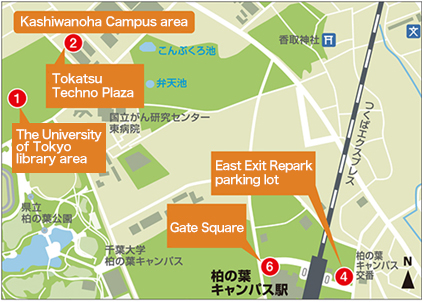
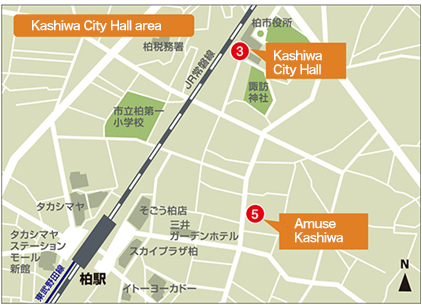
Next to the sidewalk in the Gate Square commercial and office building is a 1.5 m-wide personal mobility vehicle (PMV) lane. Next-generation vehicles not allowed to use public roads, like the Segway, can utilize this lane. This can be used for Gate Square management and facility tours, and for verifying cutting edge technologies at the same time as working toward a sustainable transport system.
Gate Square has many transportation spaces as a tool for creating a lively city together with residents. In conjunction with the opening of Gate Square, a partnership between the public, private and academic sectors refurbished the area in front of the west exit of Kashiwanoha Campus Station, making it into a Kashiwa-no-ha Smart City Main Street. Utilizing a special ordinance under the Special Measures concerning Urban Regeneration, the Urban Design Center Kashiwanoha set up sofas and tables on the sidewalk. Water supply and power facilities used for events have also been set up on sidewalks. Utilizing these spaces and equipment will allow for regularly holding events, such as local community markets for the consumption of locally produced food.
In Gate Square and along the west exit road in front of the station are public LAN (Kashiwanoha Wi-Fi) available to use free of charge, providing an internet environment responding to the needs of people such as inbound foreign tourists to Japan.
Benches in Kashiwano-harappa, the grassy area in Gate Square employ emergency cooking sets for use in case of disaster. Electric vehicles used for the multi-vehicle sharing program also have disaster energy boxes that can be used as an emergency power supply for the city. Power outlets and lighting here can be used in times of an emergency, and they can also be an evacuation area looking after the safety of residents.
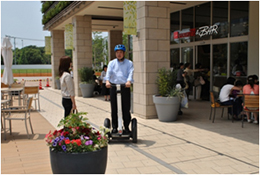
Scene of facility management for Segways using the PMV lane
|
 |
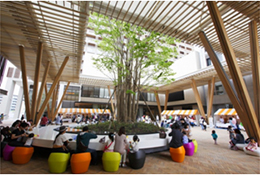
Gate Square’s Central Plaza |
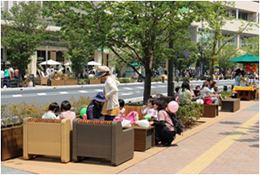
Sofas and tables set up on the sidewalk in front of Gate Square
|
 |
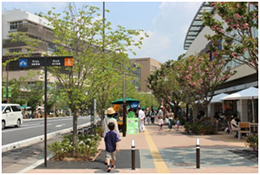
Transport space equipped for spacious sidewalks and bicycle paths |
6. A hotel and residences building that caters for various visitor requirements and enables stays from overnight through to long term residence.
The Mitsui Garden Hotel Kashiwa-no-ha hotel and residences building will have a grand opening on July 8, 2014 and in conjunction with the Park Axis Kashiwa-no-ha rental housing will see the appearance of an area for exchanges and relaxation. Mitsui Fudosan’s first ever combined rental housing and office building will fully cater to the various needs of those visiting the city.
Mitsui Garden Hotel Kashiwanoha has 137 rooms for short stays on its third to sixth floors. There are five types of room variation from single through to deluxe twin, and all customers are provided with spacious rooms, larger than 20 m2. The seventh floor contains 29 apartment hotel (serviced apartments) rooms equipped with kitchens for medium-term stays, showing that accommodation functions respond to a wide variety of requirements depending on the length of stay.
Inside the hotel is the Garden Spa, a natural hot spring that is a first for a Mitsui Garden Hotel. The sodium chloride strong saline hot spring piped up from 1,000 meters beneath the surface is used for indoor and outdoor bath, providing a relaxed atmosphere at nights and fresh atmosphere in the mornings as the sun hits, enabling a time for relaxation. The large natural spring bath is not restricted solely to hotel guests, but can also be used by residents of Park Axis Kashiwa-no-ha (except for the international exchange residences on the 14th floor).
On the first floor of the hotel and residences building is the Italian restaurant comesta, which predominantly uses local ingredients. The restaurant contains a plant factory where vegetables are grown without use of agrochemicals and used in salads and other dishes after being harvested. The restaurant offers a dining experience fusing cutting-edge technology, farming and food culture in a way possible only in Kashiwa-no-ha Smart City.
Park Axis Kashiwa-no-ha is our first rental housing in the Chiba area along the Tsukuba Express rail line, and is a hotel and residences occupying floors eight through 13. A wide variety of requirements ranging from single dwellers to families are catered for among the 114 residences, from studio-type apartments (24.77m2) to spacious 3LDK (74.68m2). Furthermore, as measures to provide security and safety, apartments are equipped in a manner only Kashiwa-no-ha Smart City can do, providing earthquake-proof design and structure, establishment of redundant energy sources during times of emergency and placement of disaster-readiness equipment, as well as visualization of energy usage, IH cooking heaters, double-glazed windows and LED lighting controlled by HEMS* responding to the environment.
* Please refer to p. 6 for information about the community incentive points program (Kashiwa-no-ha Points) for the amount of CO2 emissions reduced.
Accommodation responding to diverse requirements
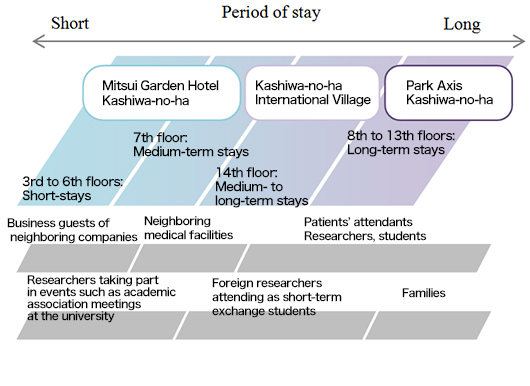
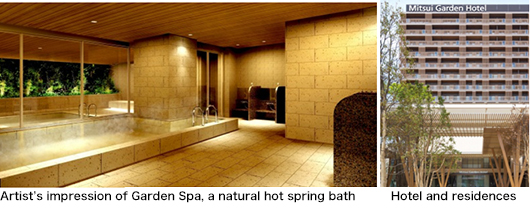
Overview of the Garden Spa Hot Spring
Hot spring water quality: Sodium chloride hot spring
Effective for: Cuts, burns, chronically inflamed skin, sickly children, chronic gynecological problems, fatigue recovery, improving health, etc.
7. Researchers and overseas students will gather from home and abroad, creating an international exchange residential area sharing lifestyle space, culture and ideas.
Kashiwa-no-ha International Village, an international exchange residence, occupies the top floor of the hotel and residences building. This shared facility is equipped with a living, dining and kitchen space, laundry and showers, as well as a Japanese-style meeting place to enable contact with Japanese culture. We will support the village becoming a pleasant living space where researchers and students from inside and outside of Japan can gather together for intellectual and cultural exchanges.
Kashiwa-no-ha International Village will tie up with universities and academic institutions in the vicinity to enable researchers and overseas students to move in ahead of the opening. Applications for residents to occupy shared housing will be accepted from July 2014.
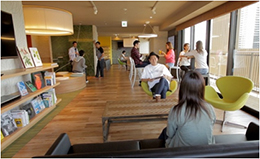 |
 |
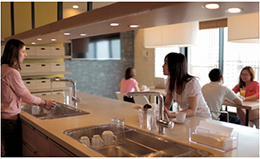 |
| Exchanges in the shared living, dining, and kitchen space |
International Village 14th Floor Layout
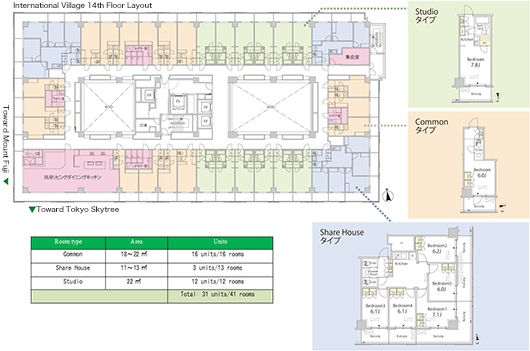
Click here to enlarge
8. Intellectual exchanges in the Open Innovation Lab and Kashiwa-no-ha Conference Center will create new industries.
KOIL, a commercial and office building to create new industries that transform the world through sharing of knowledge, technology and ideas, opened in April 2014 in advance of Gate Square. KOIL will house KOIL Park, one of Japan’s largest co-working spaces (members-only co-work space), as well as venture companies. Other facilities on site will include KOIL Factory (digital manufacturing factory), which will allow members and visitors from the general public to swiftly transform ideas into prototypes, along with a café and studio, which will foster interaction among many different types of people.
The University of Tokyo Kashiwanoha Campus Satellite Office located beside KOIL also opened in April 2014, and represents a massive research investment by the University of Tokyo and the private sector to move forward with development of new businesses and research domains such as aging populations, next-generation transport systems, and the generation of energy. The area near the Kashiwanoha Campus Station is moving ahead to become a base of new industry creation.
Opening on July 8, 2014 is Kashiwa-no-ha Conference Center, on the second floor of the hotel and residences building, has is a large hall seating approximately 400 people and six conference rooms of varying sizes, responding to a vast array of requirements ranging from seminars to exhibitions. The center can tie up with hotels to host international conferences. Upon opening, the center will actively host large-scale events under the theme of new industry creation and critical exchange while using these facilities.
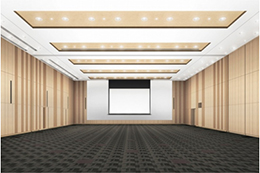
Artist’s impression of the Kashiwa-no-ha Conference Center hall
|
 |
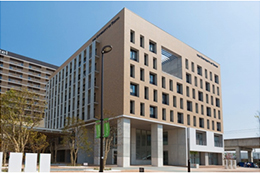
External view of the University of Tokyo Kashiwanoha Campus Station Satellite Office |
Gate Square Layout (Map)
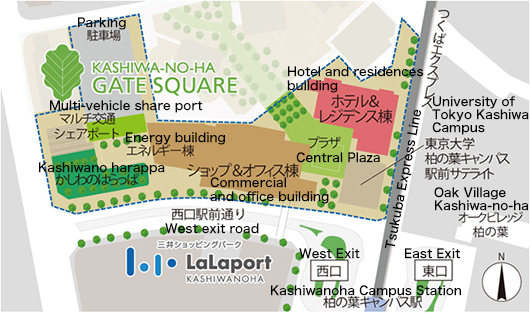
Gate Square Facility Plan Schematic
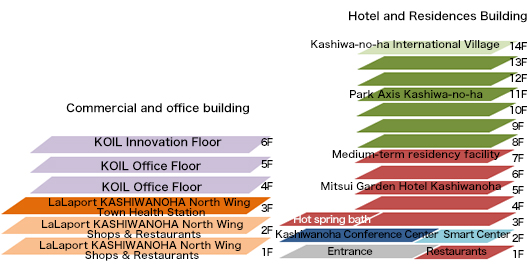
Gate Square Overview
| Name |
Gate Square |
| Location |
District 148, Kashiwanoha Campus, 178-4 Wakashiba, Kashiwa City, Chiba Prefecture |
| Access |
One minute walk from Kashiwanoha Campus station on the Tsukuba Express |
| Floors |
Commercial and office building |
Hotel and residences building |
| 7 floors above ground, 1 floor below ground |
14 floors above ground, one floor underground |
| Facility composition |
KOIL (4th -6th floors): Rentable floor space approx. 7,980 m2
LaLaport KASHIWANOHA North Wing (1st-3rd floors): 17 stores
Rentable floor space approx. 7,502 m2 |
Park Axis Kashiwa-no-ha:
Rental residences (8th - 13th floors) 114 residences
Kashiwa-no-ha International Village (14th floor) 31 residences/41 rooms
Mitsui Garden Hotel Kashiwanoha (1st floor, 3rd – 7th floors): 166 rooms
Kashiwa-no-ha Smart Center (2nd floor)
Kashiwanoha Conference Center (2nd floor)
Other: Hotel restaurant (1st floor) |
| Area |
Approx. 16,768m2 |
Approx. 7,577m2 |
| Floor space |
Approx. 32,206m2 |
Approx. 23,976m2 |
| Structure |
Steel-reinforced concrete (partly earthquake-proof design/structure) |
Steel-reinforced concrete (earthquake-proof design/structure) |
| Developer |
Mitsui Fudosan Co., Ltd. |
| Design and Construction Management |
The Zenitaka Corporation |
| Construction started |
April 2011 |
| Opening |
Grand Opening, July 8, 2014 |
| Website |
http://kashiwanoha-smartcity.com/ |
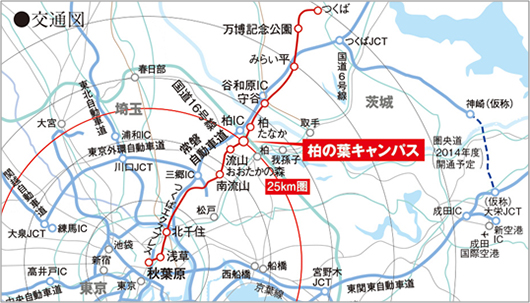
Kashiwa-no-ha Smart City Project Overview
Kashiwa-no-ha Smart City Overall Area - Overview of Land Readjustment Project
| Development area |
Kashiwa City Planning Area, north central district, Uniform Urban Development Area project |
| Developer |
Chiba Prefecture (Uniform Urban Development Area) |
| Area |
Approx. 272.9 ha |
| Planned population |
Approx. 26,0000 |
| Period |
August 2000 to March 2023 |
| Planned land use |
Residences, hotel, commercial facilities, offices, factories, research organizations, schools, hospital, banks, parks, etc. |
Pilot Area of Kashiwa-no-ha Smart City- Overview of Development for the Area around Kashiwanoha Campus Station
| Target area |
Kashiwanoha Campus Districts 147, 148, 150, and 151 |
| Developer |
Mitsui Fudosan Group (Mitsui Fudosan Co., Ltd., Mitsui Fudosan Residential Co., Ltd.) |
| Area |
Approx. 14.2ha |
| Number of residences |
Approx. 2,700 residences (Approx. 2,000 as of June 2014) (Completed construction) |
| Development period |
Scheduled for October 2005 to March 2018 (plan-approved portion until second phase of development of District 148) |
| Project cost |
Approx. 125 billion yen (plan-approved portion until first phase of development of District 148) |
| Planned land use |
Residences (approx. 2,700), hotel (number of rooms: 166), commercial facilities (estimated annual visitors: approx. 7 million), offices (estimated workers: approx. 1,000), etc. |
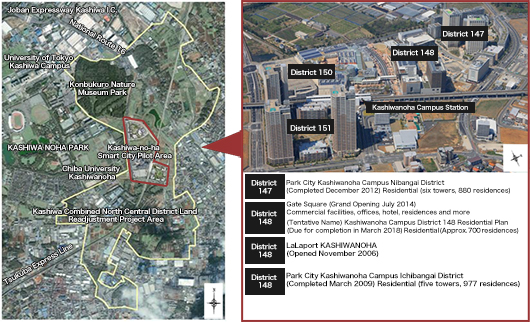
Click here to enlarge
Town Creation Process
The Kashiwa-no-ha area project started in 2000 with an allocation of approx. 273 ha as a land readjustment project based on City of Kashiwa urban planning. The University of Tokyo and Chiba University opened campuses and in 2005, the Tsukuba Express Line service commenced and Kashiwanoha Campus Station opened, improving convenience and ushering in a new era for the Kashiwa-no-ha area.
The Mitsui Fudosan Group became involved in the project from the city planning stage and has since developed a variety of city creation projects. In 2006, it opened LaLaport KASHIWANOHA and the same day also started the Urban Design Center Kashiwanoha (UDCK). UDCK is a partnership between the public, private and academic sectors formed by the University of Tokyo, Chiba University, Kashiwa City, Mitsui Fudosan Co., Ltd., the Kashiwa Chamber of Commerce and Industry, Tanaka Region Homecity Council and Metropolitan Intercity Railway Company. With its operations being shared and carried out jointly, UDCK is growing as an organization that formulates, plans and promotes organization.
In 2008 the Kashiwanoha International Campus Town Concept was formulated, stipulating adoption of eight objectives in city planning, including environmental symbiosis, transportation systems, spatial designs, new industry creation, cultural creation and an international learning environment. The idea was highly regarded inside and outside of Japan, and in 2011 the Japanese government selected the area as an Environmental Future City and Comprehensive Special Zone. The area is a problem-solving-oriented neighborhood that promotes world leading knowledge and cutting-edge technology and receives support from the government, starting with deregulation, to develop a Smart City.
The July 2014 grand opening of Gate Square will mark the full-scale start of smart city operations for this wider inclusive area. Under Innovation 2017 (the Group’s medium- and long-term management plan, the Smart City initiatives are marked down as an important strategy with the Kashiwa-no-ha Smart City positioned as a flagship project. The opening of Gate Square welcomes a new stage of urban planning for the Kashiwa-no-ha area and will, going forward, further expand Smart City functions, as well as accelerate innovations.
Chronology of Main Urban Planning Trends in the Kashiwa-no-ha Area
| February 2000 |
University of Tokyo Kashiwa Campus opens |
| August 2000 |
Kashiwa City Planning Area, north central district, Uniform Urban Development Area approved |
| September 2001 |
Mitsui Fudosan Co., Ltd. closes down the Kashiwa Golf Club. (On land now near the Kashiwanoha Campus Station) |
| April 2003 |
Chiba University Center for Environment, Health and Field Sciences (Chiba University Kashiwanoha Campus) opens |
| April 2005 |
Tsukuba Express Line starts operations |
| November 2006 |
LaLaport KASHIWANOHA opens |
| November 2006 |
Urban Design Center Kashiwanoha (UDCK) opens |
| March 2008 |
Kashiwanoha International Campus Town Concept formulated by Chiba Prefecture, Kashiwa City, University of Tokyo and Chiba University |
| March 2009 |
Park City Kashiwanoha Campus Ichibangai District completed |
| June 2009 |
Selected to become an ITS Trial Model City by the Cabinet Office |
| November 2009 |
TX Entrepreneur Partners General Incorporated Association established to support startups |
| March 2011 |
Selected as a “Future City Model Project” by Japan Business Federation (Keidanren) |
| May 2011 |
Multi-vehicle sharing program starts operations |
| December 2011 |
Comprehensive Special Zone and Environmental Future City approved |
| April 2012 |
Oak Village Kashiwa-no-ha, a hands-on food and farming leisure facility, opens (Operated by the KCJ Group) |
| May 2012 |
Asian Entrepreneurship Award, an international business contest, established |
| December 2012 |
Park City Kashiwanoha Campus Nibangai District completed |
| February 2013 |
The Kashiwa-no-ha Smart Health project, a trial service offering visualization of health statuses, starts |
| March 2013 |
Kashiwa-no-ha Smart City Museum opens |
| March 2013 |
Kashiwanoha Campus Card, Kashiwa-no-ha community incentive program operations start |
| April 2014 |
University of Tokyo Kashiwanoha Campus Satellite Office opens |
| June 2014 |
Japan’s biggest plant factory, Kashiwa-no-ha GREEN ROOm2, starts full-scale operations |
| July 2014 |
Grand Opening of Gate Square planned |